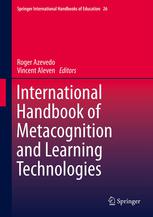

Most ebook files are in PDF format, so you can easily read them using various software such as Foxit Reader or directly on the Google Chrome browser.
Some ebook files are released by publishers in other formats such as .awz, .mobi, .epub, .fb2, etc. You may need to install specific software to read these formats on mobile/PC, such as Calibre.
Please read the tutorial at this link: https://ebookbell.com/faq
We offer FREE conversion to the popular formats you request; however, this may take some time. Therefore, right after payment, please email us, and we will try to provide the service as quickly as possible.
For some exceptional file formats or broken links (if any), please refrain from opening any disputes. Instead, email us first, and we will try to assist within a maximum of 6 hours.
EbookBell Team

5.0
98 reviewsEducation in today's technologically advanced environments makes complex cognitive demands on students pre-learning, during, and post-learning. Not surprisingly, these analytical learning processes--metacognitive processes--have become an important focus of study as new learning technologies are assessed for effectiveness in this area.Rich in theoretical models and empirical data, the International Handbook of Metacognition and Learning Technologies synthesizes current research on this critical topic. This interdisciplinary reference delves deeply into component processes of self-regulated learning (SRL), examining theories and models of metacognition, empirical issues in the study of SRL, and the expanding role of educational technologies in helping students learn. Innovations in multimedia, hypermedia, microworlds, and other platforms are detailed across the domains, so that readers in diverse fields can evaluate the theories, data collection methods, and conclusions. And for the frontline instructor, contributors offer proven strategies for using technologies to benefit students at all levels. For each technology covered, the Handbook: Explains how the technology fosters students' metacognitive or self-regulated learning.Identifies features designed to study or support metacognitve/SRL behaviors.Reviews how its specific theory or model addresses learners' metacognitive/SRL processes.Provides detailed findings on its effectiveness toward learning.Discusses its implications for the design of metacognitive tools.Examines any theoretical, instructional, or other challenges.These leading-edge perspectives make the International Handbook of Metacognition and Learning Technologies a resource of great interest to professionals and researchers in science and math education, classroom teachers, human resource researchers, and industrial and other instructors.